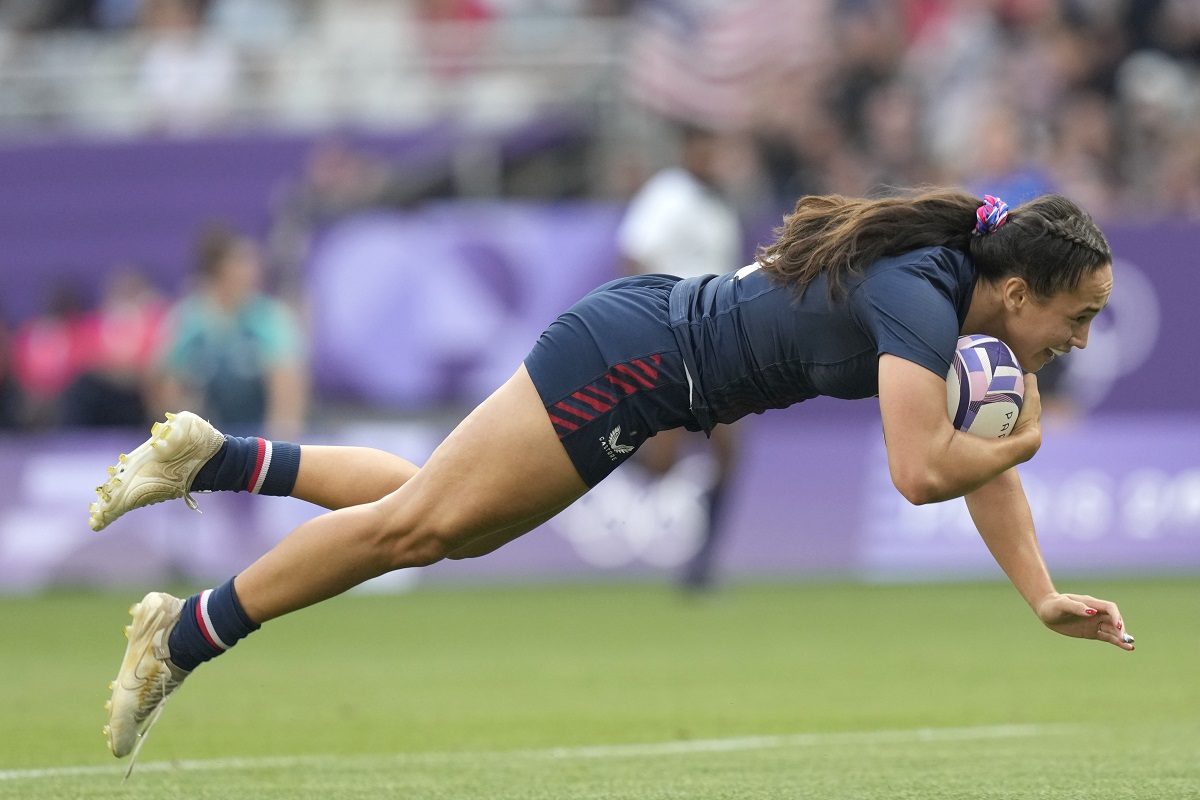US Women Win a First Olympic Medal in Rugby Sevens with a Comeback Victory over Australia

United States’ Alex Sedrick scores the winning try during the women’s bronze medal Rugby Sevens match between the United States and Australia at the 2024 Summer Olympics, in the Stade de France, in Saint-Denis, France, Tuesday, July 30, 2024. The US won the match 14-12.
11:51 JST, July 31, 2024
SAINT-DENIS, France (AP) — Alex Sedrick ran the length of the field, dived in under the posts and then calmly took the conversion, securing a first Olympic rugby sevens medal for the United States with a 14-12, last-minute upset over Australia.

Members of the United States Rugby Sevens team pose for the media with their bronze medals after the medals ceremony at the 2024 Summer Olympics, in the Stade de France, in Saint-Denis, France, Tuesday, July 30, 2024.
Ilona Maher watched in awe as Sedrick bumped off two tacklers near her own tryline before sprinting all the way to the other end to score in front of a 60,000-plus crowd at Stade de France and spark jubilation for the Americans.
“I was kind of like, ‘What is this? No way? It was crazy because I was like, ‘No, there’s no way this is happening,” Maher said of the audacious, winning try. “And then for her to have to make the kick as well, and she’s not our kicker.”
The American women lost to defending champion New Zealand in the semis — their first experience at that level — but overcame a 12-7 deficit against the 2016 champion Australians with just seconds on the clock.
The Australians scored first via Maddison Levi — who set a record for most tries in an Olympic tournament — but Alev Kelter got the Americans back into it with a try to level before halftime.
Levi scored again with about two minutes to play but the Australians missed the conversion, leaving the door open if the Americans scored a try and converted it.
It’s a fast-paced game, much faster than traditional 15-a-side rugby. It’s two seven-minute halves, multiple matches daily over three days — and only seven players on each team on a full-size field. As all the coaches and players say, anything can happen.
For Sedrick, the game-breaking play was just an example of her “trying to channel my big girls. Ilona Maher. I’m just trying to be like her.”
Maher is the undisputed face of women’s rugby in America, but Sedrick’s long-range try is the defining image of the bronze medal game.
The American players and staff rushed onto the field to celebrate. Sammy Sullivan was in tears, after watching the finish from the sidelines. Maher raised both arms up in triumph.
Bruce Springsteen’s “Born in the U.S.A.” blared over the stadium speakers.
The U.S. women had to wait until after New Zealand beat Canada 19-12 in the final to take their place on the podium. Maher and teammates Naya Tapper, Kelter and Lauren Doyle had waited so long for this. Others, like U.S. Army captain Sammy Sullivan, were there for the first time.
Maher was a breakout social media star at the Tokyo Olympics three years ago, when her funny outtakes of life in the pandemic-era athletes’ village went viral.
But she was devastated after a quarterfinal loss to Britain. She did a lot of sports psychology and worked out how to stay centered and also keep promoting rugby and women’s sports and her team with her social media presence.
“I wanted to be good at social media — and I do a lot of social media — but also be a very good rugby player,” she said. “And that was important to me.”
The medal is evidence of that.
“It was important for me to show I am funny but I’m also the real deal and I also a very good rugby player,” she said. “And so it was important for me to show that you can be anything. You can be beast, beauty, brains.”
Top Articles in Sports
-

Milano Cortina 2026: Figure Skaters Riku Miura, Ryuichi Kihara Pair Win Gold; Dramatic Comeback from 5th Place in SP
-

Milano Cortina 2026: Kokomo Murase Comes Out on Top After Overcoming Obstacles, Aiming for Greater Heights in Competition
-

Milano Cortina 2026: Riku Miura, Ryuichi Kihara Clinch Japan’s 1st Gold in Pairs Figure Skating, Rebounding from Disappointing Short Program
-

Milano Cortina 2026: Olympics-Torch Arrives in Co-Host Cortina on Anniversary of 1956 Games
-

Milano Cortina 2026: Japan’s Athletes Arrive in Italy for Milano Cortina Winter Olympics; Other Athletes to Arrive from Now
JN ACCESS RANKING
-

Japan PM Takaichi’s Cabinet Resigns en Masse
-

Japan Institute to Use Domestic Commercial Optical Lattice Clock to Set Japan Standard Time
-

Israeli Ambassador to Japan Speaks about Japan’s Role in the Reconstruction of Gaza
-

Man Infected with Measles Reportedly Dined at Restaurant in Tokyo Station
-

Videos Plagiarized, Reposted with False Subtitles Claiming ‘Ryukyu Belongs to China’; Anti-China False Information Also Posted in Japan





















